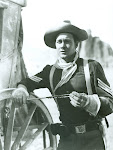Today marks the death of character actor and occasional leading man Philip Carey, who appeared in several Westerns during the course of his career. Here's what IMDB has to say about him: Tall, blond and ruggedly handsome Philip Carey started out as a standard 1950s film actor of rugged westerns, war stories and crime yarns but didn't achieve full-fledged stardom until well past age 50 when he joined the daytime line-up as ornery Texas tycoon Asa Buchanan on the popular soap
"One Life to Live" (1968) in 1979. He lived pretty much out of the saddle after that, enjoying the patriarchal role for nearly three decades.He was born with the rather unrugged name of Eugene Carey on July 15, 1925, in Hackensack, New Jersey. He grew up on Long Island and served with the Marine Corps during World War II and the Korean War. He attended (briefly) New York's Mohawk University and studied drama at the University of Miami where he met his college sweetheart, Maureen Peppler. They married in 1949 and went on to have three children: Linda, Jeffrey and Lisa Ann.The 6'4" actor impressed a talent scout with his brawny good looks while doing the summer stock play, "Over 21" in New England, and he was offered a contract with Warner Bros. Billed as Philip Carey, he didn't waste any time toiling in bit parts, making his film
debut billed fifth in the
John Wayne submarine war drama
Operation Pacific (1951). Phil could cut a good figure in military regalia and also showed strong stuff in film noir. A most capable co-star, he tended to be upstaged, however, by either a strong female or male star or by the action at hand. He was paired up with
Frank Lovejoy in the McCarthy-era
I Was a Communist for the FBI (1951), and
Steve Cochran in the
prison tale
Inside the Walls of Folsom Prison (1951). Warner Bros. star
Joan Crawford was practically the whole movie in the film noir
This Woman Is Dangerous (1952) co-starring an equally overlooked
David Brian and
Dennis Morgan;
Calamity Jane (1953) was a vehicle for
Doris Day; and he donned his familiar cavalry duds in the background of
Gary Cooper in the Civil War western
Springfield Rifle (1952).In 1953, Carey left Warner Bros. and signed up with Columbia Pictures where he was, more than not, billed as "Phil Carey," but he struggled with the same rather bland, rugged mold again as the stoic soldier or police captain. He found plenty of work, however, and some as the top-billed star, but he felt stuck in the "B"-level grind. He battled the Sioux in
The Nebraskan (1953); played a former gang member of Butch Cassidy and the Sundance Kid who has to clear his name in
Wyoming Renegades (1954); was a brute force to be reckoned with in
They Rode West (1954); and had one of his standard movie roles (as an officer) in a better quality movie, Columbia's
Pushover (1954), which spent more time promoting the
debut of its starlet
Kim Novak as the new
Marilyn Monroe. Overshadowed by
James Cagney and
Jack Lemmon in
Mister Roberts (1955) and by
Van Heflin, young
Joanne Woodward (in her movie
debut) and villain
Raymond Burr in the western
Count Three and Pray (1955), Phil turned more and more to TV in the late '50s. A man of action, he took on the role of Canadian-born Lt. Michael Rhodes on the series
"Tales of the 77th Bengal Lancers" (1956) alongside
Warren Stevens. He eventually left Columbia studios to do a stint (albeit relatively short) playing
Raymond Chandler's unflappable detective
"Philip Marlowe" (1959). Most of the 60s and 70s, other than a few now-forgotten film adventures such as
Black Gold (1962),
The Great Sioux Massacre (1965) and
Three Guns for Texas (1968), were spent either saddling up as a guest star on
"The Rifleman" (1958),
"Bronco" (1958),
"The Virginian" (1962) and
"Gunsmoke" (1955) or hard-nosing it on such crime series as
"77 Sunset Strip" (1958),
"Ironside" (1967),
"McCloud" (1970),
"Banacek" (1972) and
"Felony Squad" (1966). He also played the regular role of a stern captain in the Texas Rangers western series
"Laredo" (1965).Phil was a spokesperson for Granny Goose potato chips commercials, and his deep voice served him well for many seasons as narrator of the nature documentary series
"Untamed World" (1967). One of his best-remembered TV guest appearances, however, was a change-of-pace role on the comedy
"All in the Family" (1971) in which he played a vital, strapping blue-collar pal of Archie Bunker's whose manly man just happened to be a proud, astereotypical homosexual. His hilarious confrontational scene with a dumbfounded Archie in Kelsey's bar remains a classic.Phil's brief regular role in the daytime soap
"Bright Promise" (1969) in 1972 was just a practice drill for the regular role he would play in 1979 as Texas oilman Asa Buchanan in
"One Life to Live" (1968). His popularity soared as the moneybags manipulator you loved to hate. Residing in Manhattan for quite some time as a result of the New York-based show, he played the role for decades until diagnosed with lung cancer in January of 2006. Forced to undergo chemotherapy, he officially left the serial altogether in May of 2007, and his character "died" peacefully off-screen a few months later.Divorced from his first wife, Phil married a much younger lady, Colleen Welch, in 1976 and has two children by her, daughter Shannon (born 1980) and son Sean (born 1983). Phil lost his battle with cancer on February 6, 2009, at the age of 88.






















